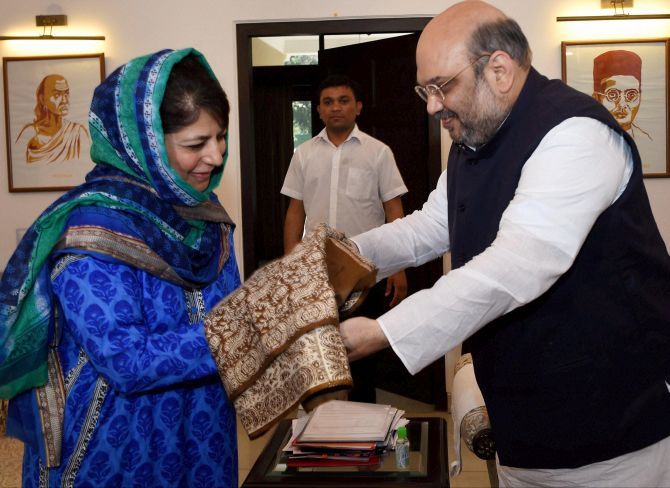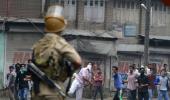'The National Conference and the Peoples Democratic Party, as recent events suggest, are quite content as New Delhi's collaborators rather than trying to be true representatives of the Kashmiri people,' says Athar Parvaiz.

Kashmir is a political problem and it needs a political solution.
Kashmiris have been hearing this refrain as often as the region erupts into protests in favour of 'azadi.' Once transitory peace stages a comeback, the political seeds of the problem are sent into dormancy -- much like seeds in winter -- until they flourish in yet another spring of uprising.
Any major political solution to Kashmir -- involving India, Pakistan and the Kashmiris -- has remained elusive and would most likely be so at least in the near future, given the cranky politics and self-serving narratives of the present-day political leaders in New Delhi and Islamabad.
What is intriguing is the fact that despite an overflow of expressions like 'address the political dimensions of the Kashmir issue' and 'win the hearts of Kashmiris' being bandied about, the Kashmiris have never got even a semblance of respect with regard to their basic political and human rights.
Here, I'm only referring to respect for political and human rights as per the understanding of pro-India political parties like the National Conference and the People's Democratic Party, and not to the political aspiration for 'azadi' in Kashmir, which is currently witnessing a massive upsurge.
It took the rationality of a leader like Atal Bihari Vajpayee -- years after P V Narasimha Rao's 'anything short of azadi' and H D Deve Gowda's 'sky is the limit' catchphrases about autonomy had turned out to be mere slogans -- to consider a political engagement with Kashmiri leaders, including militant commanders, across the board.
Vajpayee's carefully chosen slogans of 'insaniyat' (humanity) and 'jhumuriyat' (democracy) were never adopted to reach out to the Kashmiris, even as his political engagement with Pakistan, in the light of yet another famous slogan coined by him -- 'you can change your friends, but not neighbours' -- achieved some results, like the famed Agra summit in July 2001.
Why the Vajpayee lexicon of insaniyat and jhumuriyat came down to sheer word play is not only New Delhi's fault, though it has always played the deadly games of political brinkmanship when it comes to Kashmir.
One big tragedy of Kashmir lies in the manner in which mainstream politics plays out in its attractive yet uneasy environs.
Kashmir's two major pro-India political parties, the National Conference and the Peoples Democratic Party, have totally stopped pursuing their own political objectives or party visions on the resolution of the issue, despite their seemingly avowed ideology that political justice lay at the core of a solution on Kashmir.
Both parties have come up with their respective political solutions for the Kashmir issue which are well-documented, but neither of them has been able to convince New Delhi to implement their solutions, not even partly.
The National Conference's autonomy resolution, which seeks the restoration of the pre-1953 constitutional position for Kashmir, was passed in the Jammu and Kashmir assembly in June 2000 on the basis of a report prepared by the nine-member State Autonomy Committee.
The party's renewed faith in autonomy was the upshot of New Delhi's assurance to the National Conference in 1996 that Kashmir would be given maximum autonomy if the party agreed to contest the assembly elections.
New Delhi had grown extremely desperate to hold elections in Jammu and Kashmir as it had extended President's rule several times in a row since January 19, 1990 -- which had caused severe damage to its democratic credentials.
Farooq Abdullah succumbed to the lure at a time when New Delhi had no option other than the National Conference to be at the vanguard of this exercise, given the presence of its cadres all across Kashmir.
After doing Delhi's bidding, the National Conference failed to secure the promised political capital. Ever since, the National Conference has made occasional half-hearted statements on Kashmir's autonomy as a mere formality.
And the PDP's October 2008 self-rule document, which prescribes political and economic integration of the divided parts of Kashmir -- along with de-militarisation as the 'best solution' without affecting the sovereignty of India and Pakistan -- has been around for the past eight years, but the party has also failed to build a significant pathway down that road.
Despite contesting two elections after releasing its self-rule document, the PDP never made significant efforts to realise its 'dream'.
It rather chose to hide behind the smokescreen of suggesting measures on the peace process and dialogue, words which Kashmir-based mainstream politicians find quite convenient and inoffensive with a fair idea about their futility, given how seriously their suggestions on involving Pakistan and Hurriyat leaders are taken in New Delhi.
Except the National Conference's failed June 2000 resolution on autonomy, we have never witnessed either of the parties pursuing its goals Constitutionally.
When the PDP faced the crucial test of defending its ideology following the 2014 elections, it chose to ally with the Bharatiya Janata Party, whose position on Kashmir's so-called 'special status' was clear.
Provided the nature and compulsions of their politics, the PDP and National Conference were expected to convince New Delhi, even if it meant resorting to agitations, to adopt and implement their solutions for giving Kashmiris the much-needed solace and were expected to leave the 'azadi struggle' to pro-freedom politicians.
But they hardly showed any such signs, even when the political circumstances created by years of armed rebellion and massive resentment against New Delhi had presented them with a windfall.
Instead, what they do is a pure need-based, non-serious and extremely ambiguous politics of demanding the initiation of a 'dialogue' and 'peace process', that too when some human rights violation or a pure ideological drive, as is being witnessed currently, flares up passions in the valley.
They, as recent events suggest, are quite content as New Delhi's collaborators rather than trying to be true representatives of the Kashmiri people.
When New Delhi needed to carry out panchayat elections in 2011 in Jammu and Kashmir, to showcase the spread of grassroots democracy, these two major mainstream political parties promptly took the call, only to make many of their unguarded panchayat members sitting ducks to terrorist attacks while themselves enjoying the security of fortifying zones in Srinagar and huge security escorts on roads and public places.
Being the older player, the National Conference in particular has been a mute spectator to Delhi's self-destructive manoeuvring in Kashmir, as long as it remains in charge of state administration or an 'actor' in Kashmir politics even with a nondescript role.
Some events particularly clinch this argument.
For example, did the National Conference ever bother about carrying out the 'mass awareness programme' for 'educating people and political leaders across India' which it had talked about when its autonomy resolution was rejected by the Union Cabinet weeks after its submission in June 2000?
In fact, the statement about starting a 'mass awareness programme' was made to fend off criticism as to why the party does not deem it necessary to snap ties with the BJP, which then headed the National Democratic Alliance government at the Centre.
Even after its defeat in the 2002 assembly elections, the National Conference chose to remain silent on its autonomy demand until the 2008 elections, when it made a passing reference to this demand in its vision document.
It remained unfazed when the report submitted by the three interlocutors -- headed by Dileep Padgaonkar -- to the United Progressive Alliance government in 2011 was not taken with the seriousness it deserved.
The report, apart from recommending 'meaningful autonomy,' had pleaded that the army's visibility should be reduced, human rights violations should be urgently addressed and the Armed Forces (Special Powers) Act should be reviewed.
Before that, the National Conference had shown a similar response when the Justice Sagheer Committee report, which had also recommended greater autonomy, was consigned to cold storage.
If the pro-freedom leaders can manage massive agitations and endure house arrests in pursuance of a political objective which seems far difficult to achieve than the National Conference and the PDP's political demands within the Constitution, why could these two parties not even attempt warning New Delhi of launching an agitation in favour of their demands?
Similarly, both parties have failed to give any respite to common Kashmiris from a heavy army and paramilitary presence and the impunity they enjoy, even as the militancy, going by official figures, has almost faded into nothingness for years now.
Neither of the two parties has been able to convince New Delhi to withdraw troops from peaceful pockets in the valley, where the security presence is unwanted. Nor has the AFSPA been withdrawn even from a small pocket of any district.
As regards human rights violations, there is hardly any evidence for punishing the perpetrators, except in the case of the Machil fake encounter.
When he was out of power before 2008, Omar Abdullah had rightly demanded the setting up of a 'Truth and Reconciliation Commission' for probing the crimes committed by all the parties since 1988 in Kashmir, but he reneged on this demand after coming to power.
So, if the PDP and the National Conference have not been able to deliver on the basic expectations of the Kashmiri people, what moral authority do they have to tell Kashmiris that they represent them in New Delhi?
Rather, they represent New Delhi in Kashmir; and unfortunately for New Delhi, clumsily at that.
ALSO READ










